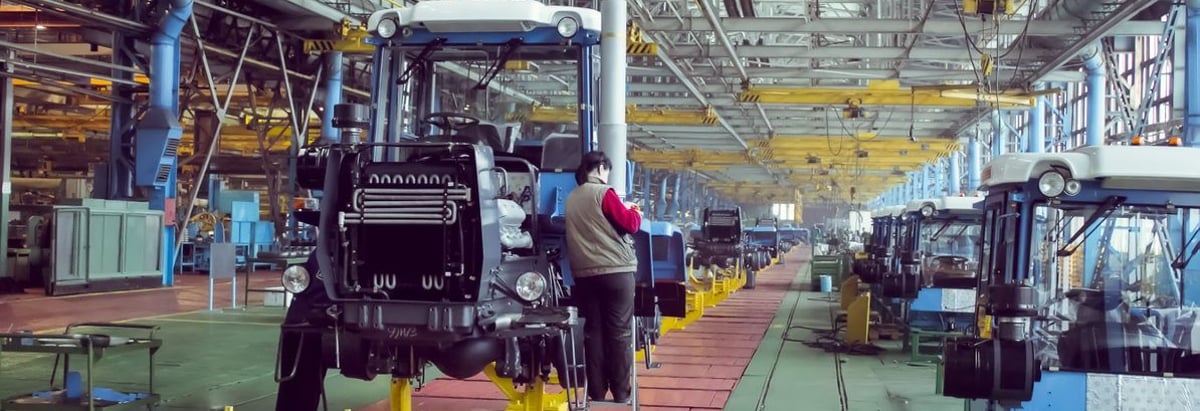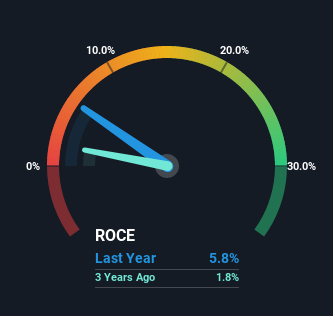Returns On Capital At Jain Irrigation Systems (NSE:JISLDVREQS) Paint A Concerning Picture

What underlying fundamental trends can indicate that a company might be in decline? A business that's potentially in decline often shows two trends, a return on capital employed (ROCE) that's declining, and a base of capital employed that's also declining. This indicates the company is producing less profit from its investments and its total assets are decreasing. Having said that, after a brief look, Jain Irrigation Systems (NSE:JISLDVREQS) we aren't filled with optimism, but let's investigate further.
What Is Return On Capital Employed (ROCE)?
If you haven't worked with ROCE before, it measures the 'return' (pre-tax profit) a company generates from capital employed in its business. Analysts use this formula to calculate it for Jain Irrigation Systems:
Return on Capital Employed = Earnings Before Interest and Tax (EBIT) ÷ (Total Assets - Current Liabilities)
0.058 = ₹4.4b ÷ (₹125b - ₹50b) (Based on the trailing twelve months to December 2022).
Thus, Jain Irrigation Systems has an ROCE of 5.8%. Ultimately, that's a low return and it under-performs the Machinery industry average of 16%.
View our latest analysis for Jain Irrigation Systems

While the past is not representative of the future, it can be helpful to know how a company has performed historically, which is why we have this chart above. If you're interested in investigating Jain Irrigation Systems' past further, check out this free graph of past earnings, revenue and cash flow.
What Can We Tell From Jain Irrigation Systems' ROCE Trend?
There is reason to be cautious about Jain Irrigation Systems, given the returns are trending downwards. About five years ago, returns on capital were 8.9%, however they're now substantially lower than that as we saw above. And on the capital employed front, the business is utilizing roughly the same amount of capital as it was back then. Since returns are falling and the business has the same amount of assets employed, this can suggest it's a mature business that hasn't had much growth in the last five years. If these trends continue, we wouldn't expect Jain Irrigation Systems to turn into a multi-bagger.
In Conclusion...
In summary, it's unfortunate that Jain Irrigation Systems is generating lower returns from the same amount of capital. Investors haven't taken kindly to these developments, since the stock has declined 67% from where it was five years ago. That being the case, unless the underlying trends revert to a more positive trajectory, we'd consider looking elsewhere.
Jain Irrigation Systems does have some risks, we noticed 3 warning signs (and 1 which is a bit unpleasant) we think you should know about.
While Jain Irrigation Systems may not currently earn the highest returns, we've compiled a list of companies that currently earn more than 25% return on equity. Check out this free list here.
New: Manage All Your Stock Portfolios in One Place
We've created the ultimate portfolio companion for stock investors, and it's free.
• Connect an unlimited number of Portfolios and see your total in one currency
• Be alerted to new Warning Signs or Risks via email or mobile
• Track the Fair Value of your stocks
Have feedback on this article? Concerned about the content? Get in touch with us directly. Alternatively, email editorial-team (at) simplywallst.com.
This article by Simply Wall St is general in nature. We provide commentary based on historical data and analyst forecasts only using an unbiased methodology and our articles are not intended to be financial advice. It does not constitute a recommendation to buy or sell any stock, and does not take account of your objectives, or your financial situation. We aim to bring you long-term focused analysis driven by fundamental data. Note that our analysis may not factor in the latest price-sensitive company announcements or qualitative material. Simply Wall St has no position in any stocks mentioned.
About NSEI:JISLDVREQS
Jain Irrigation Systems
Manufactures and sells micro-irrigation systems in India, Europe, North America, and internationally.
Adequate balance sheet and slightly overvalued.
Market Insights
Community Narratives



